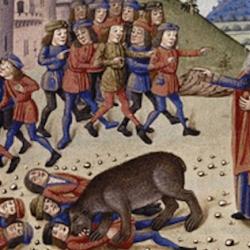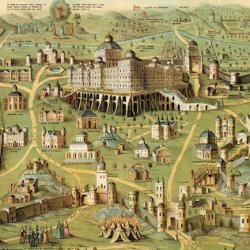INTRODUCTION
Ahab?s son continues in his father?s ways, worshiping Baal and seeking Baal?s aid rather than looking to Yahweh. But there is a God in Israel, and Elijah is His prophet. And Elijah is like the flame of God burning away the dross of Israel.
THE TEXT
?Jehoshaphat the son of Asa had become king over Judah in the fourth year of Ahab king of Israel. Jehoshaphat was thirty-give years old when he became king, and he reigned twenty-five years in Jerusalem . . . .?E(1 Kings 22:41-2 Kings 1:18).
STRUCTURES
Ahab?s death is recorded in 1 Kings 22:40, and the remainder of 1 Kings gives us a summary of the reigns of Jehoshaphat of Judah and the beginning of the reign of Ahaziah, Ahab?s son. Jehoshaphat is generally a faithful king, continuing in the reformed ways of Asa and extending them by expelling the sodomites from the land (cf. 14:24; 15:12). Like Solomon, he establishes trading contacts with the Gentiles (v. 48; cf. 9:28; 10:22). In fact, he is superior to Solomon at least to the extent that he subdued the Edomites (v. 47; cf. 11:14ff.). He is condemned for some failures, particularly his failed to remove the high places and his peace with Ahab. But Jehoshaphat learned his lesson, and did not agree to participate in Ahaziah?s shipping business (vv. 48-49; contrast 22:4).
The break between 1-2 Kings is nonsensical, since it comes in the middle of the account of the reign of Ahaziah. To understand what?s happening in 2 Kings 1, we need to see it as a continuation of the account begun at the end of 1 Kings. The passage is structured as follows:
a. Ahaziah?s reign and sickness, 1 Kings 22:51-2 Kings 1:1a
b. Ahaziah sends messengers meet Elijah, 1:2b
c. Yahweh?s messenger sends Elijah, 1:3-4
d. Report of Elijah?s words to the king, 1:5-8
b. Ahaziah sends soldiers to get Elijah, 1:9-14
c?E Yahweh?s messenger sends Elijah to the king, 1:15-16
a. Ahaziah?s death and end of his reign, 1:17-18
The story is terribly repetitive. Yahweh?s message to Ahaziah?s messengers is repeated three times (vv. 3, 6, 16). Each time, the Hebrew construction doubles the verb ?die,?Eusing a phrase that could be translated as ?dying you shall die.?E Verses 16-17 bring this to a climax; verse 16 ends with ?dying you shall die?Eand verse 17 begins ?and he died.?E In addition, three sets of soldiers come to Elijah, and their approach is similar in the first two instances.
THE SICK KING
Throughout Kings, a king?s sickness is a sign of the sickness of the kingdom or the dynasty (cf. 1 Kings 14; cf. 2 Kings 23:31; 24:18). Jeroboam?s dynasty ends shortly after a story of a sick prince, and the same is true of the Omride dynasty. The Omride dynasty is worse than Jeroboam?s: At least Jeroboam consulted a prophet of Yahweh; Ahazkiah consults Baal-zebub (?lord of flies?E, and consults him in Ekron, a Philistine city. As with Jeroboam?s son, Ahab?s son dies peacefully with the dynasty still intact, but the dynasty falls during the reign of a second son. This is related to the first-second son pattern in Genesis, except that here the older son is removed and disaster falls on the second son.
In context, Ahaziah?s sickness is related to the loss of Moab. Moab has not been mentioned in Kings so far (except 1 Kings 11:7). David, who had family connections with Moab (cf. Ruth 4), had incorporated Moab into Israel (2 Samuel 8:2, 12). Because Israel has indulged idolatry, Yahweh is chipping bits away from the kingdom. So too, when the church ?rebels against the King,?Ethen the Lord removes territory ?Eas when the Lord gave over the Middle East and North Africa to Islam.
MAN OF GOD, FIRE OF GOD
2 Kings 1 contrasts Yahweh and King Ahaziah. Ahaziah sends messengers (the word is the same for ?angel?E to consult with Baal, but the ?messenger of Yahweh?E(v. 3) sends Elijah to confront the messengers. As elsewhere in Kings, the prophet?s ministry is ?perpendicular?Eto the history of the kings; Ahaziah makes a plan, embarks on a path, but Elijzah crosses the path and interrupts the plan. The writer uses the same technique here that he used in 1 Kings 21: Verse 3 is the message of the Angel of Yahweh, but while he?s speaking the scene changes and Elijah himself takes up the message. Yahweh?s word is identified with Elijah?s word, and Yahweh?s word prevails over the word of Ahaziah.
As elsewhere in Kings, too, the writer contrasts Elijah to the false gods. When the messengers describe the man who confronted them, they call him a ?baal of hair?E(v. 8). In a sense, Elijah is a ?god?Eto Ahaziah, as Moses was to Pharaoh, the god that Ahaziah should consult. Elijah?s divine power is highlighted in verses 9-16. Ahaziah sends three sets of 50 soldiers to bring Elijah down and back to Samaria. Like Yahweh Himself, Elijah is dwelling on a mountain. The captains call on Elijah as a ?man of God?E(Heb. ish elohim). Instead of coming down from the mountain, Elijah sends the ?fire of God?E(Heb. esh elohim) to consume the first two sets of soldiers. Elijah was a man like us (James 5), but he was capable of sending fireballs from heaven. The pun on points to the fact that Elijah himself is the ?fire of God?Ewho prophesies among the Israelites in order to consume them (cf. Jeremiah 1:10). The third captain gets the point, and begs Elijah to have mercy.
Elijah?s message to Ahaziah is a message of doom. Because Ahaziah has not sought the Lord or His prophet, but has gone to consult with Baal, ?dying he will die.?E Ahaziah has nothing to say in response. He does not, as his father did, plead for mercy. He rolls over and takes it.
Catechism for Little Saints
Whom does Ahaziah go to for help?
He goes to a false God, Baal-zebub.
Whom should we go to for help?
To the Lord, and to His greatest prophet, Jesus.
For Further Study
1.Three times Ahaziah is told that he will never ?come down?Efrom his bed alive (vv. 4, 6, 16). The verb ?come down?Eis used elsewhere in the passage (vv. 9, 10, 11, 12, 15). What?s the significance of this?
2. Compare the references to ?bed?Ein this chapter to 1 Kings 17:19 and 2 Kings 4:32. What?s the point of these repeated references to ?beds?E















